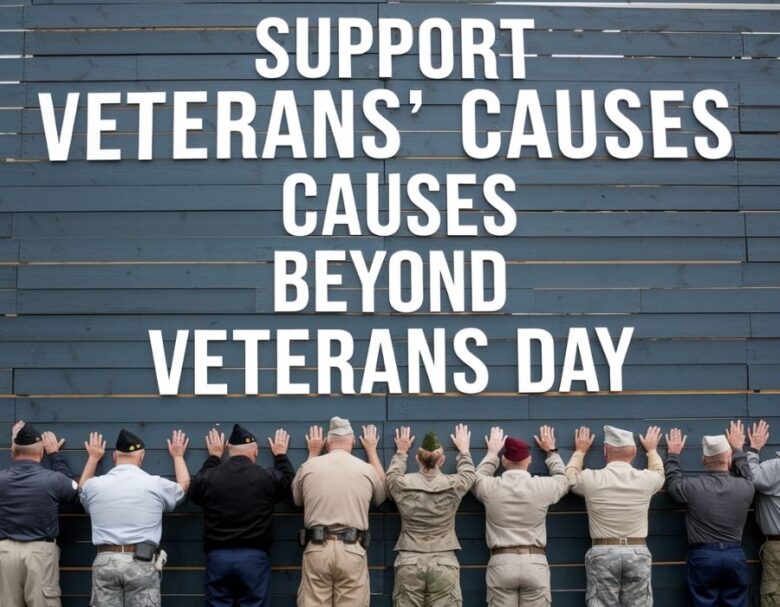While Veterans Day is a significant annual event to honor those who have served, supporting veterans should be a year-round commitment. As we look beyond Veterans Day 2025, it’s crucial to understand how to provide continuous and meaningful support to veterans and their families. This comprehensive guide will explore various ways individuals, businesses, and communities can contribute to veterans’ causes throughout the year. From volunteering at local VA hospitals to supporting veteran-owned businesses, we’ll delve into practical strategies on how to make a lasting impact on the lives of those who have sacrificed so much for our country. By implementing these ideas, you’ll learn how to extend your support beyond a single day and become an active advocate for veterans’ well-being, ensuring they receive the recognition and assistance they deserve all year long.
Key Takeaways:
- Year-round support is crucial for addressing veterans’ ongoing needs
- Diverse approaches can cater to different veteran demographics and issues
- Collaboration with established organizations enhances impact
- Personal involvement creates meaningful connections with veterans
- Advocacy and awareness-raising are important components of support
Understanding the Need for Continuous Support
While Veterans Day is an important annual recognition, veterans face challenges throughout the year. Continuous support is essential to address issues like healthcare, employment, housing, and mental health.
Step-by-Step Guide to Supporting Veterans Year-Round
1. Educate Yourself (Ongoing)
- Research common issues facing veterans
- Stay informed about current legislation affecting veterans
- Learn about different eras of service and their unique challenges
2. Volunteer with Veterans Organizations (Monthly)
- Identify local veterans’ service organizations
- Commit to regular volunteer hours
- Offer your professional skills (e.g., legal, medical, financial advice)
3. Create a Community Support Network (2-3 months to establish)
- Form a local group dedicated to veteran support
- Organize regular meetups or support groups for veterans
- Develop a resource guide for local veteran services
4. Participate in Veteran-Focused Events (Quarterly)
- Attend or organize job fairs for veterans
- Participate in fundraising runs or walks
- Support veteran-owned businesses through dedicated events
5. Advocate for Veteran Issues (Ongoing)
- Contact local representatives about veteran-related legislation
- Write letters to editors or op-eds about veteran concerns
- Use social media to raise awareness about veteran issues
6. Provide Direct Support to Veteran Families (Monthly)
- Offer respite care for caregivers of disabled veterans
- Organize meal trains or home repair assistance
- Provide childcare support for veteran families in need
7. Support Veteran Mental Health Initiatives (Ongoing)
- Promote awareness of PTSD and suicide prevention resources
- Organize or participate in peer support groups
- Fundraise for veteran mental health programs
8. Assist with Employment and Education (Quarterly)
- Mentor veterans transitioning to civilian careers
- Offer internships or apprenticeships for veterans
- Support scholarship programs for veterans or their children
9. Contribute to Veteran Housing Solutions (Annually)
- Volunteer with organizations building homes for veterans
- Donate to programs preventing veteran homelessness
- Advocate for veteran-friendly housing policies in your community
10. Organize Care Package Drives (Bi-annually)
- Collect and send care packages to deployed troops
- Prepare welcome home kits for returning veterans
- Create holiday gift packages for veterans in VA hospitals
11. Support Veteran-Focused Arts and Culture (Quarterly)
- Attend veteran art exhibitions or performances
- Promote veteran authors and artists
- Organize creative workshops for veterans
12. Engage in Veteran History Projects (Ongoing)
- Conduct and record interviews with local veterans
- Help preserve veteran memorabilia and documents
- Contribute to digital archives of veteran stories
Innovative Ideas for 2025 and Beyond
- Develop a veteran support app connecting volunteers with veteran needs
- Create virtual reality support groups for veterans with mobility issues
- Implement AI-powered job matching services for veterans
- Organize e-sports tournaments for veterans to build community
- Develop smart home technology specifically for disabled veterans
Addressing Diverse Veteran Needs
- Support programs for women veterans
- Assist LGBTQ+ veterans in accessing tailored resources
- Provide culturally competent support for veterans of color
- Address the unique needs of elderly veterans
- Support student veterans in higher education
Frequently Asked Questions
Q: How can I support veterans if I have limited time? A: Consider making donations, using veteran-supporting businesses, or participating in online advocacy efforts.
Q: What are some ways to involve children in supporting veterans? A: Organize school letter-writing campaigns, involve kids in care package assembly, or create youth volunteer programs at veteran events.
Q: How can businesses support veterans beyond hiring practices? A: Offer veteran discounts, sponsor veteran events, provide pro-bono services, or create veteran-focused product lines.
Q: What are some less obvious needs of veterans that require support? A: Consider supporting programs for financial literacy, relationship counseling, adaptive sports, or assistance with navigating VA benefits.
Q: How can technology be leveraged to support veterans in 2025? A: Explore telemedicine options for rural veterans, develop accessible smart home technologies, or create online platforms for skill-sharing among veterans.
Conclusion
Supporting veterans’ causes beyond Veterans Day 2025 requires a sustained, multifaceted approach that addresses the diverse needs of the veteran community. By engaging in ongoing education, volunteering, advocacy, and direct support, individuals and communities can make a significant impact on veterans’ lives throughout the year. Remember that effective support often involves both addressing immediate needs and working towards long-term solutions for systemic issues affecting veterans. As you implement these ideas, you’ll not only be honoring veterans’ past service but also actively contributing to their well-being and success in civilian life. Continuous support demonstrates a genuine commitment to ensuring that veterans receive the respect, care, and opportunities they deserve long after their service has ended.




